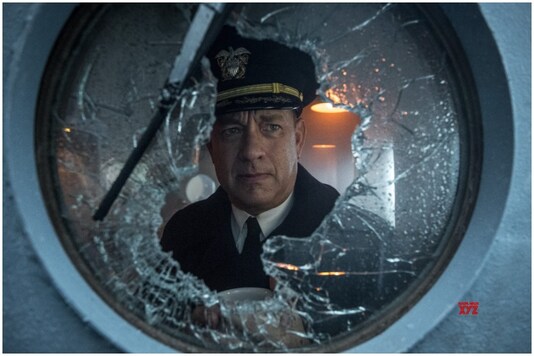Greyhound
Cast: Tom Hanks, Elisabeth Shue
Director: Aaron Schneider
It is rare to find a film that invests all its fortunes on a single actor, and Aaron Schneider's Greyhound, now on Apple Plus TV, does precisely this. The one man who carries the entire weight of the taut narrative, through terrifyingly turbulent waters of the Atlantic Ocean in a zigzag pattern to avoid being torpedoed is, but who else, Tom Hanks. A master of many moods on screen, he has been seen playing characters as diverse as a man forced to live on an uninhabited island for four years in Cast Away, as an AIDS patient in Philadelphia, as someone with a low IQ in Forrest Gump, as Professor Langdon in Dan Brown's adaptations, as a romantic in Sleepless in Seattle and You've Got Mail, as a pilot in Sully getting a plane to land on water and as a captain taken hostage by Somali pirates in Captain Phillips.
In Greyhound, Hanks' Ernest Krause, is the US Naval Commander of a battleship tasked with taking a large number of ships carrying supplies and troops across the Atlantic during World War II. The fleet has to cross a 50 mile “black pit” when it will have no air cover, because the stretch is too far from both the European and American shores. It is there that German submarines pitch themselves to destroy Allied ships.
Greyhound is not a true story and is based on a 1955 novel, The Good Shepherd by C S Forester. Scripted by Hanks (who makes his debut in this category), the movie has Krause bidding a hurried goodbye to his wife, Evie (Elisabeth Shue) before he gets on to his battleship to play a no-nonsense captain, whose word is law.
In about 100 minutes, the 1942 battle of the Atlantic is enacted with gripping precision and no false note. At the end of the 50-hour journey fraught with peril and pain, Krause, dodging the torpedoes from German U-Boats and managing to destroy four of them (a great record we are told), is a tired man, his feet bleeding after being continuously standing giving orders and literally starving himself.
In some ways, Greyhound is great action, the rough sea and the wily Germans (You will all die today, they keep announcing through their broadcasts) adding to the nail-biting thrill. Lensed with utmost care, the film may well earn Hanks an Oscar nod even a win. He is commander in every sense of the term, his jaws tight, eyes unwavering as they search out for the German boats even as he keeps playing a cat-and-mouse game with them.
In the entire movie, he makes one mistake of calling one black steward by the name of another black steward. Call it sheer fatigue, but probably in the kind of racially tense times now, none other than Hanks can get away with this.
While Greyhound is an entirely Hanks' take and is a great piece of work, it seriously lacks in one department. There is very little effort made to flesh out the characters, and this includes Krause. The others are as thinly written, and this means Greyhound is completely devoid of the human angle – the kind I saw in some of the early World War II masterpieces like Von Ryan's Express, The Bridge on the River Kwai, Battle of the Bulge and so on. Who can forget the closing scene in Von Ryan's Express when he fails to get on to the train and is gunned down by pursuing Germans. So, Greyhound may be an exciting watch, but lacks the emotional touch. A miss that cannot be overlooked in an otherwise fine piece of narration.
Rating: 4/5










